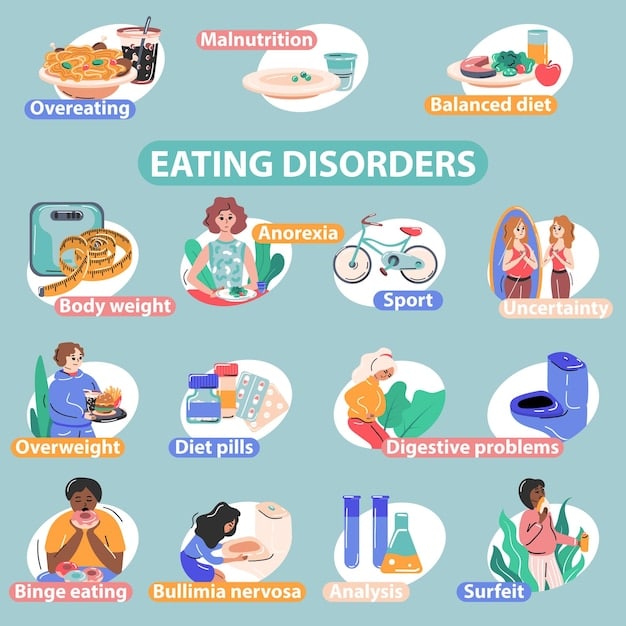Is Intermittent Fasting Right for You in 2025? A Data-Driven Guide

Intermittent fasting (IF) remains a popular dietary approach in 2025, but its suitability varies greatly depending on individual health goals, lifestyle, and adherence to evidence-based guidelines, making a personalized assessment crucial before adopting this eating pattern.
Thinking about trying intermittent fasting in 2025? The popularity of this eating pattern continues, but it’s essential to understand if it’s the right choice for you. This data-driven guide, **Is Intermittent Fasting Right for You in 2025? A Data-Driven Guide**, will walk you through the pros and cons, potential benefits, and how to make an informed decision tailored to your individual needs.
Understanding Intermittent Fasting: A 2025 Overview
Intermittent fasting (IF) involves cycling between periods of eating and voluntary fasting on a regular schedule. It’s not a diet in the traditional sense, but rather an eating pattern. By 2025, various IF methods have evolved, and a deeper understanding of its physiological effects has emerged.
Common Intermittent Fasting Methods
Several approaches to intermittent fasting exist, each with its own unique schedule and intensity. Understanding these methods is key to finding one that suits your lifestyle.
- 16/8 Method: This involves fasting for 16 hours and eating within an 8-hour window.
- 5:2 Diet: Eat normally for five days of the week and restrict calorie intake to around 500-600 calories on the other two non-consecutive days.
- Eat-Stop-Eat: This involves a 24-hour fast once or twice a week.
Choosing the right IF method depends on your individual preferences, schedule, and health goals. Experimentation and careful monitoring are crucial.
In conclusion, intermittent fasting is more than just a fad; it’s a structured eating pattern with various methods. Understanding these options allows you to make an informed decision about incorporating IF into your lifestyle.

The Potential Health Benefits of Intermittent Fasting
Intermittent fasting has been linked to a variety of health benefits, ranging from weight management to improved metabolic health. While research is ongoing, the existing data suggests promising outcomes for certain individuals.
Weight Loss and Body Composition
One of the most touted benefits of IF is its potential to aid in weight loss. By restricting eating windows, individuals may naturally consume fewer calories. Furthermore, IF can promote fat loss while preserving muscle mass.
Metabolic Health Improvements
IF has demonstrated potential in improving various aspects of metabolic health. Studies suggest it can enhance insulin sensitivity, reduce blood sugar levels, and improve cholesterol profiles.
- Improved Insulin Sensitivity: IF can help your body use insulin more effectively, reducing the risk of type 2 diabetes.
- Reduced Inflammation: Some research indicates that IF can lower markers of inflammation in the body.
- Brain Health Benefits: Emerging evidence suggests IF may support brain health and cognitive function.
While these health benefits are promising, it’s essential to approach IF with realistic expectations and consult with a healthcare professional before starting.
In summary, intermittent fasting offers several potential health benefits, particularly in the areas of weight loss and metabolic health. However, these benefits should be considered in the context of individual health status and lifestyle factors.
Is Intermittent Fasting Safe? Potential Risks and Side Effects
While IF can offer numerous benefits, it’s important to be aware of the potential risks and side effects. Not everyone is a suitable candidate for IF, and certain individuals should exercise caution or avoid it altogether.
Common Side Effects
Some individuals may experience side effects when starting IF, particularly during the initial adaptation phase. These can include:
- Hunger and Cravings: Feeling hungry is a natural consequence of restricting eating windows.
- Irritability and Mood Changes: Fluctuations in blood sugar levels can impact mood and energy levels.
- Headaches and Fatigue: These symptoms are more common during the initial days of IF.
Who Should Avoid Intermittent Fasting?
Certain populations should avoid IF due to potential health risks.
Individuals with a history of eating disorders, pregnant or breastfeeding women, and those with certain medical conditions should consult with a healthcare professional before considering IF.
Overall, while IF can be safe for many, it’s crucial to be aware of the potential risks and side effects. Individual considerations and professional guidance are essential to ensure safety.

Personalizing Your Intermittent Fasting Approach in 2025
The key to successful intermittent fasting in 2025 lies in personalization. There is no one-size-fits-all approach, and tailoring IF to your individual needs and preferences is crucial for long-term adherence and optimal results.
Assessing Your Health Status
Before starting IF, it’s essential to assess your current health status. Consider any pre-existing medical conditions, medications you are taking, and your overall fitness level.
Matching the Method to Your Lifestyle
Choose an IF method that aligns with your daily routine, work schedule, and social commitments. The 16/8 method, for example, may be easier to integrate into a busy lifestyle than a 24-hour fast.
Personalizing your IF approach involves considering your health status, lifestyle, and goals. By tailoring the method to your individual needs, you increase your chances of success and sustainable adherence.
Data-Driven Insights: What the Research Says About Intermittent Fasting in 2025
By 2025, a wealth of data has accumulated regarding intermittent fasting. Understanding the research findings can help you make an informed decision about whether IF is right for you.
Long-Term Studies and Outcomes
While many studies have examined the short-term effects of IF, long-term data is still emerging. Some studies have shown promising results in terms of weight maintenance and metabolic health over several years.
Comparing IF to Other Diets
Research has compared IF to other popular diets, such as calorie restriction and the Mediterranean diet. Findings suggest that IF can be an effective alternative for weight loss and metabolic improvement.
- Effectiveness for Weight Loss: IF can be as effective as traditional calorie restriction for weight loss.
- Metabolic Benefits: IF may offer unique metabolic benefits compared to other diets.
- Adherence Rates: Some individuals find IF easier to adhere to than continuous calorie restriction.
Analyzing the research landscape reveals that IF holds promise as a viable dietary strategy. However, further studies are needed to fully understand its long-term effects and optimal application.
In conclusion, data-driven insights support the potential benefits of intermittent fasting. However, it’s essential to stay informed about the latest research and consider individual factors when evaluating its suitability.
Integrating Intermittent Fasting Into Your 2025 Lifestyle
Successfully integrating intermittent fasting into your lifestyle requires careful planning and mindful execution. By setting realistic goals and adopting sustainable habits, you can maximize the benefits of IF while minimizing potential challenges.
Setting Realistic Goals
Start by defining clear, achievable goals for your IF journey. Whether your aim is weight loss, improved energy levels, or better metabolic health, having specific goals in mind will help you stay motivated.
Building Sustainable Habits
Focus on building sustainable habits that support your IF efforts. This includes:
- Planning Your Meals: Prepare your meals in advance to ensure you have healthy options during your eating window.
- Staying Hydrated: Drink plenty of water, especially during fasting periods.
- Listening to Your Body: Pay attention to hunger cues and adjust your IF schedule as needed.
Integrating IF into your lifestyle is a gradual process that requires patience and flexibility. By setting realistic goals and building sustainable habits, you can create a routine that works for you.
| Key Aspect | Brief Description |
|---|---|
| ⏰ Timing | Choose an IF method that fits your schedule. |
| 🍎 Diet Quality | Focus on nutrient-dense foods during eating windows. |
| 💧 Hydration | Stay well-hydrated, especially when fasting. |
| 🩺 Consultation | Consult a healthcare professional before starting IF. |
Frequently Asked Questions About Intermittent Fasting
The 16/8 method involves fasting for 16 hours each day and restricting your eating window to 8 hours. For example, you might eat between noon and 8 PM and fast for the remaining 16 hours.
Yes, but it’s important to listen to your body. Some people prefer to exercise before breaking their fast, while others find it better to exercise during their eating window. Adjust based on your energy levels.
You can drink water, black coffee, unsweetened tea, and other non-caloric beverages. Avoid drinks with calories, as they will break your fast.
Results vary depending on individual factors, but many people start to see changes within a few weeks. Consistency is key for achieving long-term success.
No, intermittent fasting is not suitable for everyone. Pregnant or breastfeeding women, individuals with a history of eating disorders, and those with certain medical conditions should avoid it or consult a healthcare professional first.
Conclusion
In conclusion, **intermittent fasting** can be a valuable tool for improving health and well-being in 2025, but it is essential to approach it with careful consideration and personalization. By understanding the different methods, potential benefits, and risks, you can make an informed decision about whether IF is the right choice for you. Always consult with a healthcare professional before making significant changes to your diet or lifestyle.





